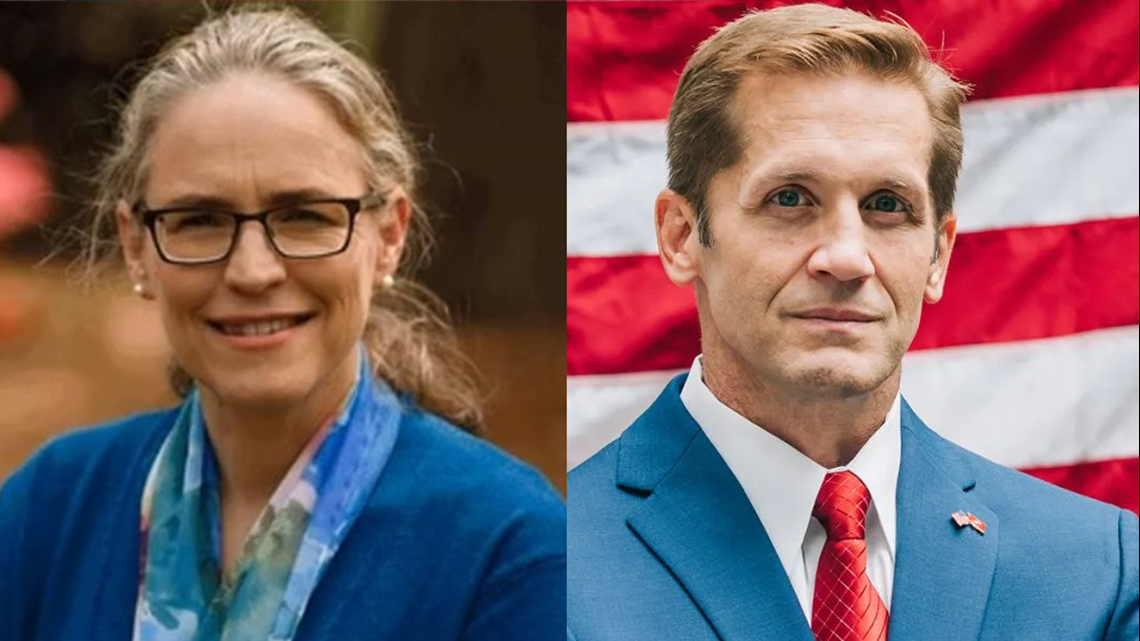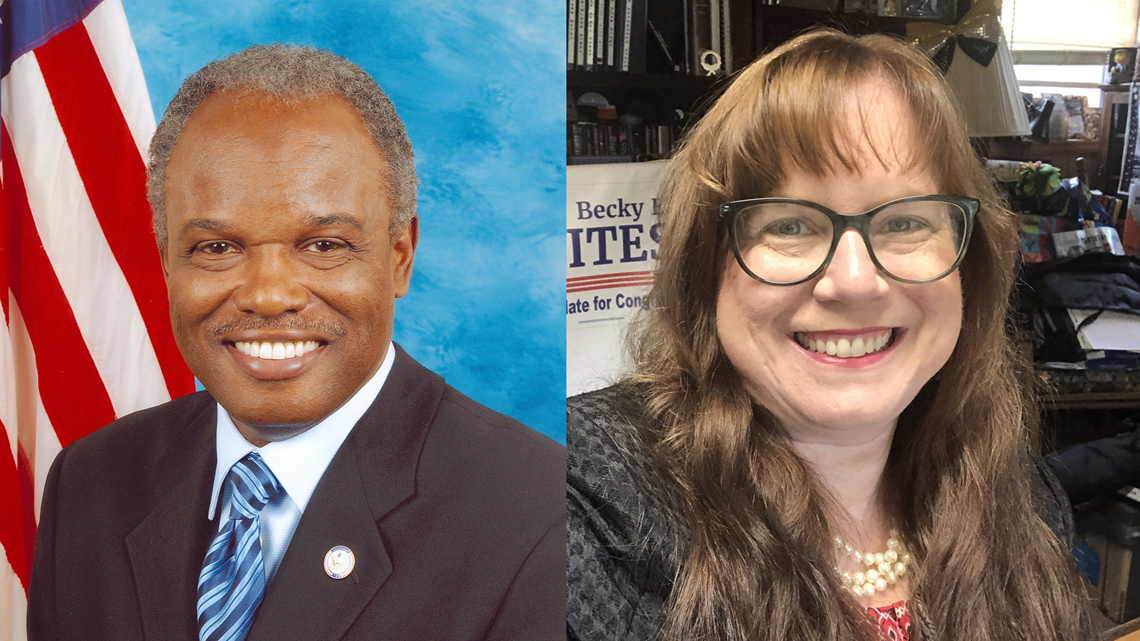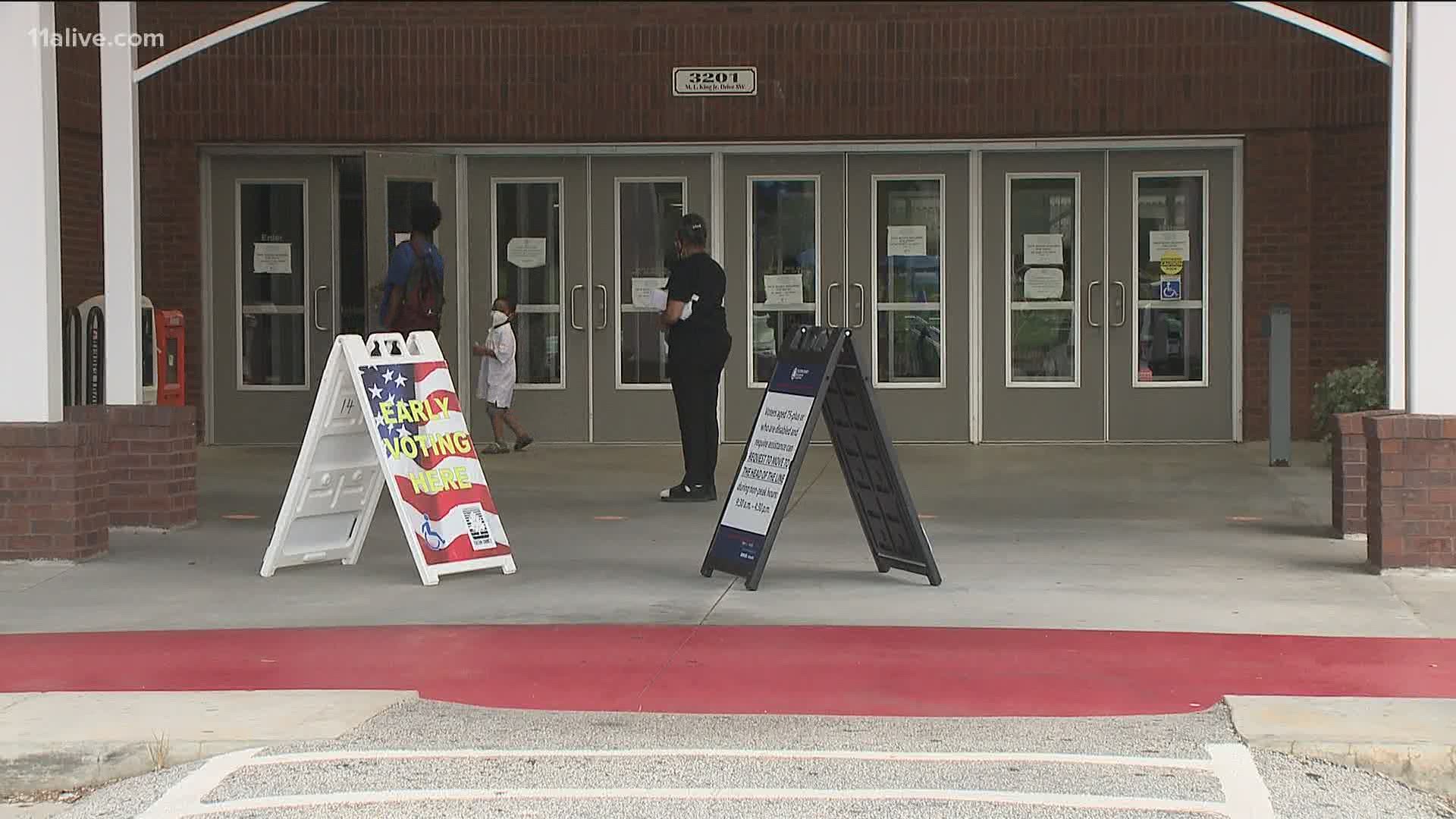ATLANTA — While most eyes this year are on the White House and the Senate races in Georgia, where the rubber meets the road is in the halls of Congress, and particularly in the House of Representatives.
The House has long been considered to be where a lot of the heavy lifting gets done when it comes to lawmaking.
Congressional representatives are elected for two-year terms, so they have to hit the ground running. While some are able to represent their constituencies for a long time, others find they have only a short period to develop relationships, influence others, craft laws and move the proverbial ball forward.
There are some seats up for grab in Georgia that are going to be very visible, with others, much less so. Each is very important in the larger picture, because each person represents one of 435 districts across the nation, all working to have their voices heard.
We're laying out a listing of details regarding each seat and each person running for those seats. As we obtain more information, we will add it to this page.
This is a living, breathing document that we hope will provide a scorecard for you to see who is who before Election Day.
14th Congressional District


Probably the most visible Congressional race in Georgia is one that is most likely considered by many experts to be a cake walk for the Repbulican candidate in the race.
Georgia's 14th Congressional District covers much of the northwestern corner of the state. It includes the cities of Dalton and Rome.
The district is about 85 percent White with Hispanic citizens slightly outnumbering Blacks 10.1 percent to 9.8 percent, according to 2010 Census Bureau figures.
Republican Tom Graves has represented the district since it was formed in 2013. Graves represented Georgia's 9th District prior to that point, which covered a more east-to-westerly swath of far north Georgia between 2010 and 2013.
Graves is retiring following the end of the current congressional session, leaving the seat up for grabs.
Democratic candidate Kevin Van Ausdal will face Republican Marjorie Taylor Greene for the seat.
Van Ausdal was unopposed in the Democratic primary this summer. Greene had a longer road to the GOP nomination, and has made more waves of her own.
In the June primary, Greene picked up nearly twice the votes of her second place challenger, John Cohan, but still did not cross the 50 percent-plus-one vote threshold necessary to secure the nomination, forcing a run-off.
During the run-off election, Greene decimated Cohan, 60 percent to 40 percent, securing the Republican spot on the fall ticket.
Greene's controversial support QAnon conspiracy theories has gotten her national attention ahead of the November General Election.
Officials from both sides of the political aisle have criticized Greene for her support of the conspiracies, leading her to respond by blasting what she calls the "fake news media" and the "DC swamp."
In addition to her local supporters, she had earned support from multiple individuals around the nation, including President Donald Trump, prompting some political pundits to suggest that Greene would be the first QAnon supporter to be elected to Congress come November.
6th Congressional District


The 6th Congressional District primarily covers the northern suburbs of Atlanta and includes portions of Fulton, DeKalb and Cobb counties.
The 2020 battle in the 6th is a rematch of the fierce 2018 race between Democrat Lucy McBath who represents the district currently and Republican Karen Handel, the previous occupant of the seat.
Handel was first elected in a contentious election in 2017 after defeating current Democratic U.S. Senate candidate Jon Ossoff, in what was noted as the most expensive congressional campaign in American history.
Handel and Ossoff were the final two candidates left standing in a run-off after a "jungle primary" for the seat following the resignation of 6th District Rep. Tom Price.
Price's resignation came when the then-newly-elected President Trump tapped Price as his new secretary for Health and Human Services.
McBath was thrust into the national spotlight when her teenage son, Jordan Davis, was killed at a Jacksonville, Fla., gas station in November 2012. Davis and two other teens were parked at the gas station when a 45-year-old man shot Davis following an argument over loud music.
Becoming an advocate for gun control, McBath joined with other mothers of African American children who lost kids to gun violence or law enforcement to form Mothers of the Movement, making a number of notable appearances, including at the 2016 Democratic National Convention.
Handel, in the past, has described herself as a solid conservative, aligning herself with Trump during the 115th Congress. According to GovTrack.US, while Handel was present for more votes than any other member of the Georgia delegation, she co-sponsored the 2nd fewest bills as compared to the rest of the state delegation and introduced the 11th fewest bills as compared to House Republicans.
This was also reflected when it came to getting influential co-sponsors -- Handel accomplished this once during the 115th Congress. Overall, her bills and resolutions only had eight cosponsors in the 115th Congress.
Looking at Lucy McBath's 2019 report card from GovTrack.US, she was 2nd most present in votes in the Georgia Delegation in 2019.
In 2019, McBath joined bipartisan bills the 4th least often as compared to the remainder of the Georgia Delegation. She was also ranked as the 4th most liberal member of the Georgia Congressional Delegation -- with Democrats David Scott (13th Dist.), John Lewis (5th Dist.), and Hank Johnson (5th Dist.) being ranked as more liberal.
McBath was listed as the 13th top leader compared to other House freshman representatives and got the 14th most co-sponsors on her bills as compared to other House freshmen.
5th Congressional District


Following the death of U.S. Rep. John Lewis this summer, the solidly Democratic Atlanta-area district appears to be up for grabs, leaving a Georgia political veteran and a Republican newcomer battling for the seat in what will almost be an almost anti-climatic matter.
Georgia Democratic chair and state Sen. Nikema Williams was named as the Democratic nominee for the seat following Lewis' death from pancreatic cancer in July.
Williams' husband Leslie Small was an aide to Rep. Lewis, and Williams said the family was close to the late congressman. Lewis fought for voting rights prior to and during his career in Congress.
"Congressman Lewis has been around me for a long time. He has been a mentor and a friend. He knows the work that I have done in this party," Williams said, when asked what Lewis might think of her ascension.
"I have been in the trenches. This is not something that I planned or set up. This is something that came when preparation meets opportunity, and I just happen to be the person that was adequately prepared at the time that this opportunity presented itself," she added.
Williams will be facing the Republican nominee, reality television star and author Angela Stanton-King.
When Stanton-King announced her candidacy in March, she told 11Alive she felt compelled to run for the seat after reflecting on her past and called it a dream come true.
She had been pardoned in February by President Donald Trump after her 2004 conviction on federal conspiracy charges for her role in a car theft ring.
Since then, Staunton-King has written three books, the autobiographical "Lies of a Real Housewife" (later retitled "Life of a Real Housewife"), "Dismissed With Prejudice" and "Life Beyond These Walls."
She has also appeared on the BET series "From the Bottom Up," which focuses on women who have rebuilt their lives.
Staunton-King is the goddaughter of right-wing religious figure and Atlanta native Alveda King, who is a niece of Dr. Martin Luther King, Jr.
Staunton-King is running on a far right-wing conservative platform and, according to an NBC News article described herself on Twitter in March as “Pro GOD, Pro LIFE, Pro WOMAN, Pro AMERICA, Pro TRUMP and PRO COMMON SENSE.”
There will be a special election on September 29 to fill the remaining weeks of Lewis's term, which expires in January.
7th Congressional District


The 7th Congressional District covers parts of northeastern metro Atlanta, including parts of Gwinnett and Forsyth counties.
Historically, the district has largely voted Republican, with diminishing numbers in more recent presidential elections. President Trump carried the district 51.1 percent to Hillary Clinton's 44.8 percent.
Geographically, the district has changed dramatically over the past 20 to-30 years, shifting from a primarily rural, to an exurban, now to a primarily suburban environment.
Demographically, according to 2019 figures from the Census Bureau, the district is made up of about 46 percent White, 21 percent Black and 19 percent Hispanic residents.
Republican Rob Woodall is retiring from the seat following his current congressional term, after holding the seat since 2011.
Woodall won the seat by the barest of margins in a 2018 run-off against Democratic challenger and Georgia State University public policy professor Carolyn Bourdeaux, beating her by less than 450 votes.
Bourdeaux is running for the seat once again, and is facing Republican challenger Rich McCormick. In addition to her position at Georgia State, she also served as Director of Georgia's Senate Budget and Evaluation Office between 2007 and 2010.
McCormick has positioned himself as a political outsider. He's a decorated Marine Corps pilot and a Navy Commander. By trade, McCormick is an emergency room physician.
Due to the changing demographics of the district, coupled with Bourdeaux's performance during the 2018 cycle, many national polls and analysts are suggesting the seat is potentially one that may become a Democratic pick-up during this election. Other analysts are reluctant to do that, calling the seat a toss-up.
1st Congressional District
The 1st Congressional District covers coastal Georgia, from Savannah south to the Florida line and as far west as Moody Air Force Base, near Valdosta.
The district itself is fairly rural, but it does include the cities of Savannah, Brunswick, Waycross and Jesup. Along with Moody AFB, three other military facilities are contained within the 1st Congressional District: Kings Bay Naval Submarine Base in Camden County, Fort Stewart in Liberty County, and Hunter Army Airfield near Savannah.
Demographically, there are about 63 percent White residents, with about 30 percent Black and 6.6 percent Hispanic residents living in the district.
The 1st District has been staunchly Republican over recent election cycles -- voting for President Trump 56.4 percent to 41.0 percent for Hillary Clinton.
This was also reflected in the 2018 race for governor, with Brian Kemp besting challenger Stacey Abrams, 56 percent to 42 percent.
Incumbent Republican Buddy Carter is completing his third term in Congress. Carter's 2019 report card from GovTrack.US shows that he was able to get more bipartisan cosponsors on the most bills as compared to anyone else in the Georgia Delegation.
Likewise, Carter joined bipartisan bills 2nd most often when compared to the other members of the Georgia Delegation during 2019 so far.
Carter is ranked the 47th top leader as compared to House Republicans and the 76th most conservative when compared to all House members.
He is facing a political newcomer in Savannah-based attorney Joyce Marie Griggs. Griggs retired from the U.S. Army as a decorated lieutenant colonel.
Among the topics Griggs plans to focus on healthcare, education, the environment, racial justice, criminal justice, gun violence and veterans affairs.
The seat is expected to remain solidly Republican, according to most national polling data.
2nd Congressional District
Georgia's 2nd District covers the southwestern corner of the state, and includes the cities of Macon, Columbus, Americus, Albany, Cordele and Bainbridge.
Democrat Sanford Bishop has held the seat since 1993, and with the death of 5th District Congressman John Lewis this summer, Bishop becomes the dean -- or longest-serving member -- of the Georgia Congressional Delegation.
Demographically, the 2nd District is a majority-minority district, made up of about 52 percent Black residents, 42.25 percent White and about 5 percent Hispanic citizens. The district has been one of the most consistently Democratic-held congressional districts in the nation.
Only one Republican has ever held the seat -- and that was between 1870 and 1875.
Bishop is a member of the Blue Dog Coalition, a group of Democratic congressional representatives who identify as fiscally responsible and centrist.
He is facing Republican challenger Donald Cole in the fall election. Cole, a conservative critic, is a former speechwriter for U.S. Agriculture Secretary Sonny Perdue, and a past county-level Georgia Republican official.
Bishop's seat, however, is considered to be among the safest Democratic seats in the state, according to most pundits.
4th Congressional District


The 4th Congressional District primarily covers Atlanta's eastern suburbs and includes parts of DeKalb, Gwinnett, Newton and Rockdale counties.
The district is largely suburban, though portions of Newton and Rockdale counties still tend to be more exurban-to-rural in nature.
Demographically, much like the 2nd District, the 4th District is a majority-minority district. About 59.29 percent of the residents of the district are Black.
Just under a third -- or 30 percent are White, while another 10.2 percent are Hispanic.
Incumbent Democrat Hank Johnson has held the seat since 2007 and is expected to hold the seat once again this cycle. Johnson faces political newcomer Johsie Cruz Ezammudeen, who says she emigrated from Venezuela, becoming an American citizen in 2005.
In 2016, she says she worked with Latinos for Trump of Georgia to help secure the vote for the president in the Peach State. Working against Jon Ossoff in Cobb County during his campaign in the 6th District in 2017 was followed by work with Latinos for Kemp in 2018.
The 4th is expected to remain Democratic in this cycle, according to most national pollsters.
8th Congressional District
Georgia's 8th Congressional District runs through the south-central portion of the state, beginning north of Macon in Monroe County and running south to the Florida line, running along and primarily to the east of Interstate 75.
In addition to parts of Macon, the district includes the cities of Warner Robins, Tifton, Thomasville, Moultrie, and part of Valdosta, along with Robins Air Force Base.
The district encompasses a rural portion of the state, and based on 2018 Census data, is comprised of about 63.46 percent White residents. About 31 percent of the residents are Black, with only about 6.1 percent of the residents being Hispanic.
It is strongly Republican, having carried the state for President Trump in 2016, 63.3 percent to 34.4 percent. The margin during the 2018 gubernatorial race was similar, with Gov. Brian Kemp carrying the district over challenger Stacey Abrams, 64.1 percent to 35.2 percent.
Republican Austin Scott has held the seat since 2011, easily winning re-election in each contest since. In 2018, Scott ran unopposed.
Scott's views sit squarely to the right side of the political aisle, and his support lands solidly with Georgia's agricultural constituency, as a member of the House Committee on Agriculture. Given the presence of Robins AFB in his district, there's no surprise that he sits on the powerful House Armed Services Committee.
Within the Agriculture Committee, Scott is the ranking member of the Commodity Exchanges, Energy and Credit Subcommittee, he also sits on the General Farm Commodities and Risk Management subcommittees.
This election cycle, Scott is facing a challenge in Democratic candidate and Macon dentist Lindsay "Doc" Holliday. This is Holliday's first dip into national-level politics, though he has previously run for local offices in the Macon area.
Holliday ran unopposed in the Democratic primary this summer, and says he wants to "get the big money out of politics."
Most national polls look at the seat as a safe Republican district.
9th Congressional District
Far northeast Georgia -- what most people consider the North Georgia Mountains -- are covered by the state's 9th Congressional District.
The seat will be another open one this cycle, as its current occupant, Republican Doug Collins, has stepped down to run in the "jungle primary" for the Isakson/Loeffler U.S. Senate seat.
The notably conservative Collins is one of three candidates expected to potentially end up in a run-off for that Senate seat in what some suggest is a referendum on Donald Trump's presidency.
The district runs from the Lake Lanier area northward to the state's border with Tennessee and North Carolina, and eastward to the Savannah River border with South Carolina. It is historically Republican and staunchly conservative. The district starts as primarily exurban close to Lake Lanier, and becomes exceptionally rural by the time you get toward the state borders.
More than 77 percent of voters in the district voted for Donald Trump in 2016, while less than 20 percent voted for Hillary Clinton.
Demographically, it is probably the most one-sided district in the state. About 87 percent of the residents are White, while another 12 percent are Hispanic. Only 7 percent of the residents are Black.
Jackson County firearms dealer Andrew Clyde won the run-off for the Republican nomination, defeating Georgia state Rep. Matt Gurtler 56.3 percent to 43.7 percent.
The Democratic challenger, Devin Pandy, emigrated from Belize as an infant. He served five deployments in the U.S. Army before retiring honorably as a wounded warrior. As a second career, Pandy has taken advantage of Georgia's motion picture and television industry as an actor, mostly in local plays and independent films, but he has also appeared in network television shows and mainstream motion pictures.
Pandy describes himself as a bi-partisan Democrat who will support any legislation that benefits the 9th District, Georgia and the nation, regardless of party sponsorship. On the other hand, Clyde says he supports the 2nd Amendment, is proudly pro-life, supports President Trump and vows to do what he can to dismantle the IRS.
As one of the most conservative corners of the state of Georgia, most national poll watchers fully expect this seat to remain in Republican hands.
10th Congressional District
The 10th District covers a large swath of eastern Georgia, stretching from Atlanta's southeastern suburbs in Henry, Butts and Newton counties, to the Savannah River, and includes the cities of Athens, Eatonton, Jackson, Milledgeville, Monroe and Winder.
The district is equally split between suburban, exurban and rural areas, and is made up of about 69 percent White residents. Another 25 percent are Black, while Hispanic residents comprise about 6 percent.
It, too, has largely been Donald Trump country, electing the president 61.3 percent to 35.8 percent over Hillary Clinton in 2016. The numbers in the 2018 governor's race were nearly identical, with 61.4 percent voting for Gov. Brian Kemp and 37.7 percent voting for Democrat Stacey Abrams.
Bethlehem Republican Jody Hice is completing his third term in Congress. Before his election to Congress, Hice was a pastor and conservative radio host.
He sits on the Congressional Oversight and Government Relations Committee as well as the Committee on Natural Resources -- committees he has served on since joining the body in 2015.
As in 2018, Hice is running against Democratic challenger and Washington County nurse Tabitha Johnson-Green. In 2018, he trounced Johnson-Green by a margin of 62.9 percent to 37.1 percent.
National polls consider the seat to be a safe Republican seat and they anticipate it to remain that way for this cycle.
11th Congressional District


Georgia's 11th Congressional District covers northwest metro Atlanta, and includes parts of Fulton, Cobb, Cherokee and Bartow counties.
This is a tale of two pieces of a greater whole.
The far southern portion of the district includes parts of upper Buckhead, Sandy Springs, Vinings, Marietta, the Dobbins Air Reserve Base, Kennesaw and Acworth. The northern portion of the district includes all of Bartow and Cherokee counties.
So, you start with a very urbanized area, including major shopping and office complexes, and Truist Park, the home of the Atlanta Braves. By the time you get into upper Cobb County, you shift into a largely suburban area around Kennesaw and Acworth.
After that, you pass Allatoona Lake, where eagle-eyed television viewers may recognize backdrops from the hit TV series "Ozark." Then, you transition into exurban areas around Cartersville and Canton before shifting into the rural areas of the far north.
As a result of the geographic makeup of the district, demographically, it is about 75.5 percent White, 15.8 percent Black and 11.1 percent Hispanic.
The demographics in the district have been changing in recent years, but they are not expected to have much of an effect on this race.
Not surprisingly, the district voted strongly for Donald Trump over Hillary Clinton in 2016, 60.3 percent to 35.3 percent.
Republican Barry Loudermilk is completing his third term in the seat. He was unopposed in the GOP primary, as was his Democratic opponent, Atlanta radio talk show host Dana Barrett.
The seat is expected to remain solidly Republican, especially given the demographic makeup of the district itself.
12th Congressional District
The 12th Congressional District covers the east-central part of Georgia, and includes Augusta along with rural areas south and southeastward from there.
The now-staunchly Republican area has been represented by Republican Rick Allen since being carved from older versions of the 12th and 10th Congressional districts when the state was reapportioned to create the 14th District following the 2010 Census.
The 12th District is 59.1 percent White, 35.1 percent Black and 5.4 percent Hispanic. With the exception of Augusta, the district is largely rural in nature.
Conservative Republican Allen ran unopposed in the primary this summer, while Democratic challenger Liz Johnson decimated challenger Dan Steiner in that party's primary -- 83.7 percent to 16.3 percent.
Johnson previously was the Democratic nominee for Georgia Insurance Commissioner in 2014, and has served on multiple boards in her home of Bulloch County.
On the Hill, Allen is a member of the Committee on Education and the Workforce as well as the Committee on Agriculture.
According to most national polls, the seat is considered a safe one for Republicans this cycle.
13th Congressional District


Georgia's 13th Congressional District forms a crescent shape around the south and western portions of metro Atlanta and encompasses parts of Henry, Clayton, Fayette, Fulton, Douglas and Cobb counties.
Democrat David Scott has held the seat since 2003, and, like several other members of the Georgia delegation, is a member of the Agriculture Committee. He is also a member of the powerful Financial Services Committee.
Along with 2nd District Congressman Sanford Bishop, Scott is a member of the Blue Dog Coalition and is considered to be among the more fiscally conservative Democrats in Congress.
Scott's annual jobs fair has become a hallmark of his presence not only for his constituents but for others around metro Atlanta, allowing job seekers and businesses, both large and small to be able to connect with each other.
Scott has worked to help cut red tape with the Veterans Administration for people across the region, also.
The 13th District is primarily urban and suburban. The district is staunchly Democratic, having supported Hillary Clinton 71 percent versus 27 percent for Donald Trump in 2016. The numbers in the 2018 governor's race were even more pronounced, with Stacey Abrams picking up 76 percent of the vote in the district, versus Gov. Brian Kemp's 23.4 percent.
Demographically, the district is comprised of 59.6 percent Black, 30.5 percent White, and 10.3 percent Hispanic residents.
Scott is being challenged by Republican businesswoman Becky Hites in the general election. She says she is a champion for state's rights, minimal federal oversight and regulation, right to life, the 2nd Amendment, and legislation by Congress, not the judiciary.
National pollsters are in agreement that the district, as one of the most Democratic in the state, is likely to remain so.

